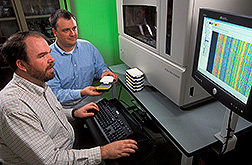This page has been archived and is being provided for reference purposes only. The page is no longer being updated, and therefore, links on the page may be invalid.
New Technique to Tap Bulls for Breeding
By Jan SuszkiwAugust 24, 2006
A project involving Agricultural Research Service (ARS) and collaborating scientists could open the door to a new, genomics-based approach to identifying elite bulls.
Now carried out by the artificial insemination (AI) industry, progeny testing characterizes the genetic merit of a bull. But progeny testing is time-consuming and expensive. Each year, AI organizations test 1,200 Holstein dairy bulls at a cost of about $30 million.
Cutting test costs while increasing the rate of genetic improvement in dairy cattle could help make the U.S. germplasm industry even more competitive in the world market, according to Curt Van Tassell. He's a geneticist working with the ARS Bovine Functional Genomics Research Unit and the ARS Animal Improvement Programs Laboratory, both in Beltsville, Md.
Records on performance and conformation are combined with pedigree information using sophisticated statistical methods to determine the genetic merit of animals used for breeding. But Van Tassell and ARS collaborators Tad Sonstegard and George Wiggans are investigating an approach called "genome-enhanced selection" which could replace progeny testing and cost around $500 per bull.
Central to the approach is obtaining information on DNA sequence variations, or genetic markers, called single nucleotide polymorphisms (SNPs). Efforts are under way to develop a test to allow close examination of 55,000 SNPs from a select group of 4,000 animals representing several dairy breeds and an ARS research population.
The scientists will then correlate the SNP data to observable, or phenotypic, traits of interest so that eventually dairy producers can use information derived from the markers to selectively breed animals based on genetic merit.
Collaborating with the Beltsville team are professors Jerry Taylor with the University of Missouri-Columbia and Stephen Moore with the University of Alberta-Edmonton, Canada; and Illumina, Inc., of San Diego, Calif.
The ARS labs have cooperative agreements with the National Association of Animal Breeders of Columbia, Mo., and Merial Limited of Duluth, Ga. The project also received funding from the USDA-CSREES National Research Initiative.
ARS is the U.S. Department of Agriculture's chief scientific research agency.

